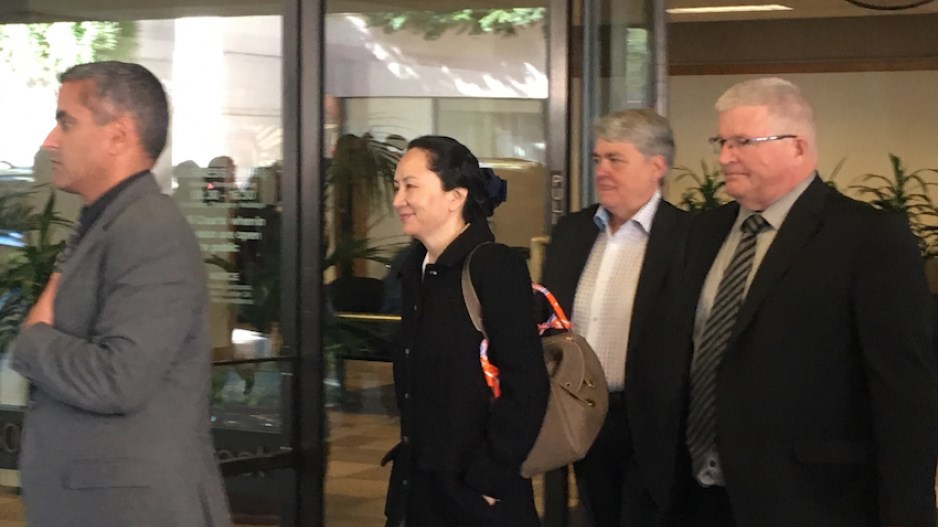The Meng Wanzhou extradition hearings resumed this morning with Crown lawyer Robert Frater continuing his final argument for the committal of the Huawei Technologies CFO.
Frater, who was challenged by presiding judge (and BC Supreme Court associate chief justice) Heather Holmes on whether Meng’s actions in a 2013 meeting with HSBC constituted fraud given the complexity of U.S. sanction laws, replied to a number of the judge’s questions.
He noted in Crown and U.S. documents that – contrary to what was presented in court Wednesday that not all business activity with Iran violated U.S. sanctions – the vast majority does all under that umbrella.
T’he Iran sanction regulations say that the exportation of supply or services – including financial services – from the United States to Iran is prohibited except when as specifically authorized or exempted by the Office of Foreign Assets Control [OFAC],” Frater told the court, adding the only difference for HSBC is that – if it was not aware of its participation in an illegal transaction – the penalties pursued by OFAC may have been civil (i.e. fines only).
But regardless, HSBC was going to face OFAC penalties for continuing to provide banking services to Huawei and Skycom, who were operating in Iran selling telecom equipment containing U.S.-made or conceived elements, Frater said.
“That’s risk faced by HSBC,” he argued. “Once OFAC was able to know there was improper transaction, there was going to be a penalty. It may be more or less severe on a bank, but the bank will be depended on for an explanation. What gives? That is the risk.”
The charge that Meng lied to HSBC in her 2013 PowerPoint presentation to convince the bank that a) Skycom was not a part of Huawei and b) HSBC is not at risk of violating U.S. sanctions by continuing the banking relationship is central to the U.S. allegations of fraud against the Chinese tech executive.
Holmes, however, did note other concerns – including the point that, when U.S. officials filed in 2019 its Record of the Case (ROC) detailing its version of what Meng has done, the decision has already been made by U.S. authorities that criminal liability is not being pursued against HSBC.
More importantly, Holmes asked, is that U.S. authorities had decided by then that HSBC was to be considered from their perspective as a victim.
“So I question the application of principles [of case precedents] on facts of which the various possibilities were still open and not inconsistent with Crown’s theory of the case,” Holmes said, questioning whether those case precedents – where the alleged victims of fraud were still open to the threat of criminal liability due to their actions – would apply in the Meng case where HSBC’s role had already been clearly defined.
Frater, however, countered that the mental intent to defraud was there for Meng and Huawei – which is the key to the Crown’s argument.
“The dishonest representations are made, then the networkers’ transaction occurs,” he said. “We had the dishonesty. We had the act reliant on the dishonesty. And the risk of deprivation was going to occur because they’ve engaged in that transaction. The offence is complete."
Frater added that other Huawei representatives made similar claims to banks like French giant BNP Paribas in 2014 to secure or retain similar banking relationships.
“The fact that other Huawei representatives made similar representations to other banks shows, in our submission, a coordinated plan of reassurance for lenders - with Ms. Meng as an integral part of that plan of reassurance,” Frater said.
“Essentially, what we are saying is Ms. Meng’s PowerPoint is clearly an artfully prepared script that is generous in its description of sanctions compliance and economical in its description of the Skycom relationship. This demonstrates... that there is a reasonable inference of the deliberate character of the representations that speaks strongly to the mental elements of the crime.”
Frater closed the Crown's committal arguments by noting the Meng's final retorts - set to begin Friday morning as defence lawyer Tony Paisana begins his arguments - will likely centre on several points but be anchored to the position that the Meng was is unique and unusual in many ways.
That position, legal experts say, is necessary because extradition cases overwhelmingly end in committal - and very few are stayed. Meng must make the case that this particular instance is extraordinary in its geopolitical backdrop and other case-specific contexts.
But Frater added that, to the Crown, the Meng case is fairly straight-forward.
"My friends, I expect, are going to argue before you that this is a unique and unprecedented case," he said. "We say getting charge for fraud for injecting horses is a unique and unprecedented case. This is a case about lying to a bank in order to get banking services continuing to flow as before. That is not an unusual thing."
Holmes countered by noting it is unusual in a fraud case where the alleged victim (HSBC) both did not suffer any eventual material losses and had members of its own employees who knew "the truth state of affairs" between Huawei and Skycom. Frater then added that those factors would then normally be taken into consideration in the sentencing phase of a formal trial, not at an extradition hearing, as it does not speak to whether a fraud actually took place or not.
The hearings continue tomorrow morning with Paisana's arguments.




